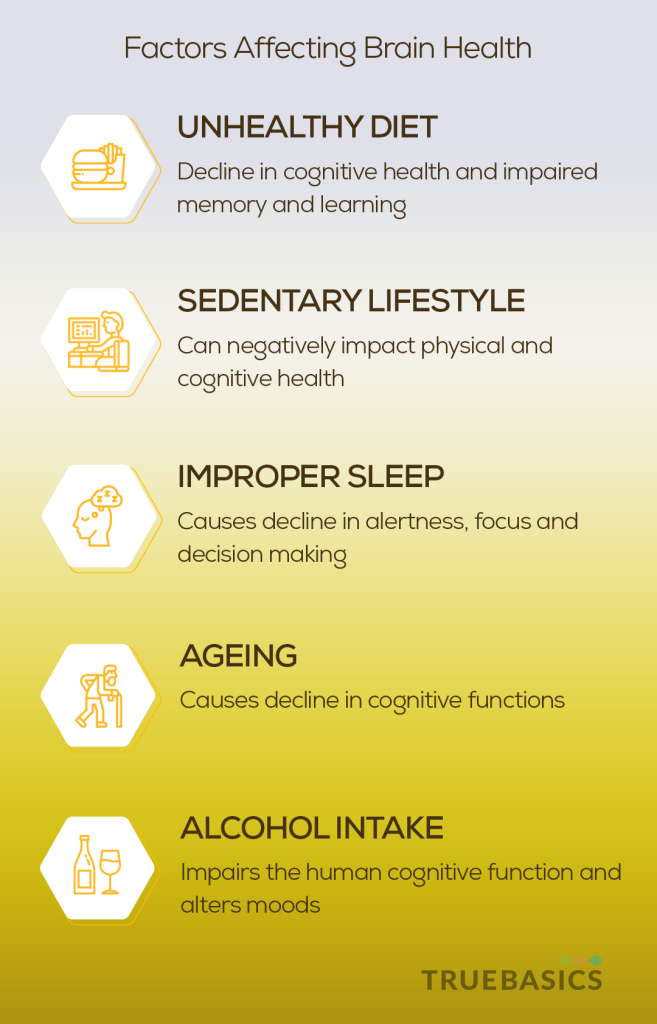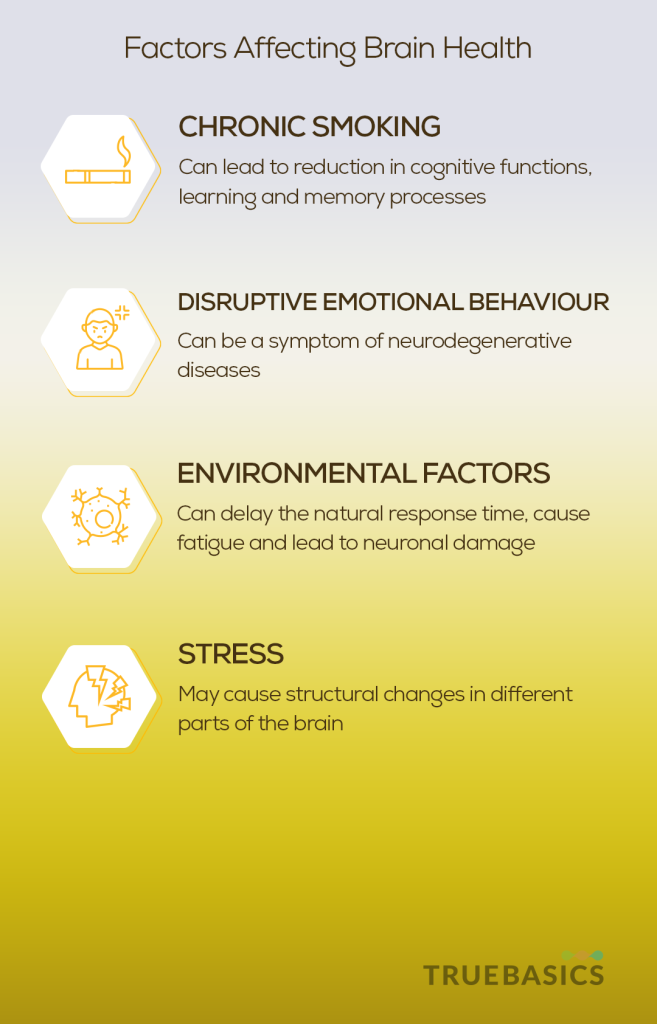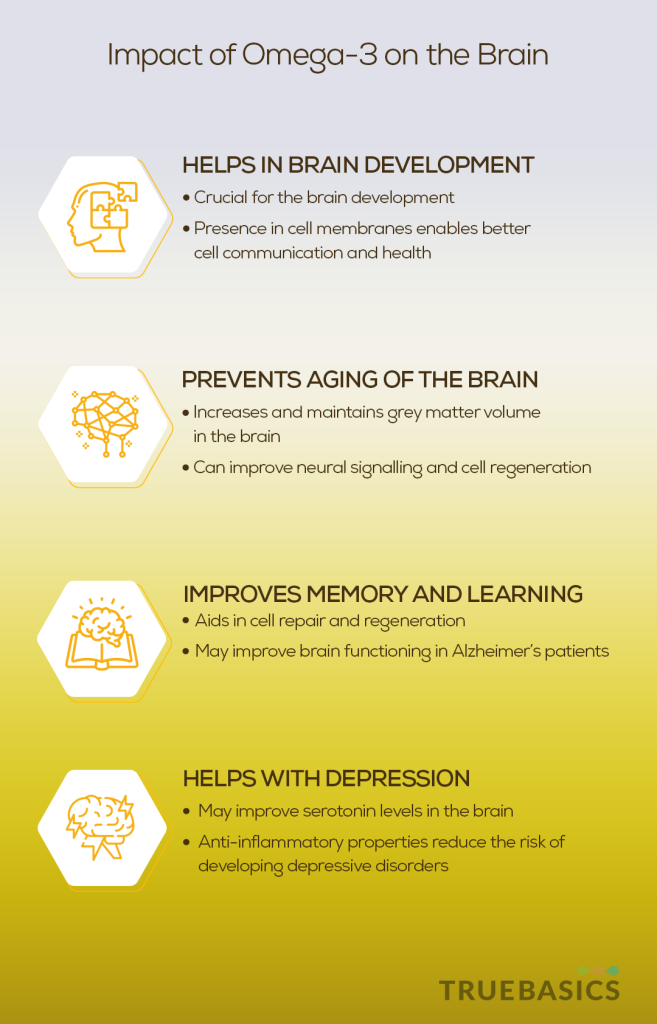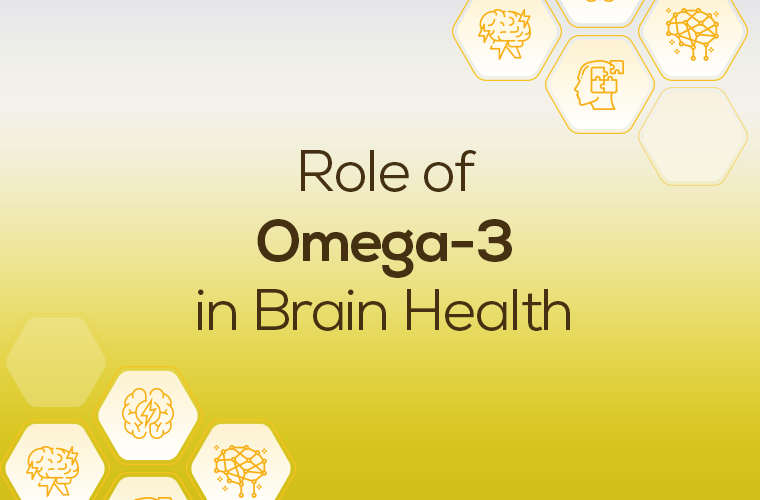A healthy brain is essential for human survival as well as maintaining a good quality of life. A healthy brain empowers the human body to have coherent thoughts, plan and execute actions, and build emotional connections.
Multiple factors can affect brain health leading to sub-optimal brain functioning, a decline in cognition and mood disorders.
Factors that affect Brain Health
1. Diet
Maintaining a healthy and balanced diet plays a significant role in regulating brain health. A balanced diet stimulates mitochondrial energy production, which improves the readiness of a nerve cell to respond to a stimulus and aids neuron signaling. Intake of a healthy diet is also essential for healthy cognitive function as it provides plasma membrane fluidity to synaptic regions.[1]
Studied have reinforced that a diet rich in omega-3 fatty acids, antioxidants, and vitamin B complex positively affects mental health. On the other hand, the intake of saturated fats and sugar can negatively impact brain functioning ability.[2]
2. Sedentary Lifestyle
A lifestyle with no or limited physical activity can impact you not only physically but has also been proven to hinder one’s cognitive health. A sedentary lifestyle puts you at risk of neurological as well as psychiatric diseases [3]. Leading a sedentary lifestyle can also lead to high blood sugar levels which may cause neuronal damage and adversely affect the body’s ability to carry out complex tasks.
Light intensity physical activities can help maintain glycemic control and help control blood sugar levels. Additionally, physical activity can also help improve overall brain health by increasing the grey matter volume of the brain. Grey matter, which contains the nerve cells in the brain and the spinal cord, has been observed to increase with physical activities according to studies. It may also improve cognitive abilities such as learning ability, memory span, attention, and executive processes.[4]
3. Sleep
An appropriate amount of sleep promotes healthy brain functions that directly impact alertness, focus and decision making. Adults require at least 7-8 hours of sleep for proper brain functioning. Our brain processes information while we are asleep. Shorter sleep cycles may make it difficult for us to concentrate or pay attention the next day [5]. This can hinder your everyday decision making abilities and cause a decline in productivity.
4. Aging
Aging has an acute impact on the human brain. With aging, the size of the human brain changes, the grey matter volume decreases and the cognitive function declines. The human brain becomes more vulnerable to inflammatory and oxidative alterations. However, making healthier lifestyle choices like maintaining a healthy diet and regular exercise can help with inhibiting and managing the effects of aging.
5. Alcohol Consumption
Alcohol consumption impairs human cognitive function and alters moods. It has been linked to aggression as well as an increased suicide risk. It directly impacts receptors in the brain influencing the serotonin levels to alter one’s feelings and impact the executive function.[6]

6. Chronic Smoking
Chronic cigarette smoking can severely impair brain health. It has been linked with global brain atrophy as well as abnormalities in different parts of the brain. This can lead to a reduction in cognitive functions, learning and memory processes, and executive functions. Chronic smoking may also make you vulnerable to neurodegenerative diseases.
7. Emotional Wellbeing
Our emotional wellbeing significantly affects our overall brain health. Disruptive emotional behavior like impulsive behavior, mood swings might be symptoms of neurodegenerative diseases. Diseases like Alzheimer’s disease or frontotemporal dementia often show symptoms of anxiety, apathy and mood swings. Parallelly, they also cause different parts of the brain to atrophy which negatively impacts cognition, emotions, and behavior.[7]
8. Environmental Factors
While note considered very often but the external environment can affect the proper functioning of the brain as well. External factors such as air pollution, water quality and exposure to extreme environments such as heat, lack of oxygen, and cold can adversely affect the human cognitive function, delaying the natural response time, causing fatigue and may even lead to neuronal damage.[8]
9. Stress
Stress can influence the human cognitive function on multiple levels – it may cause structural changes in different parts of the brain, and chronic stress may even cause atrophy of the brain. The severity of these changes increases with the intensity of the stress.[9]

Impact of Omega 3 on the Brain
The brain has a unique fatty acid composition, with high levels of omega-6 and omega-3 polyunsaturated fatty acids. Out of all the omega-3 fatty acids, docosahexaenoic acid (DHA) constitutes more than 30 % of the lipid composition of the plasma membrane in the brain. DHA is especially concentrated in the grey matter of the brain. DHA and EPA are one of the most functionally significant of all the Omega-3 fatty acids in the brain.[10]
Omega-3 Fatty acids can improve brain health by improving cognitive function, neuron functions and aiding neurogenesis or brain cell regeneration.
Role of Omega-3 Fatty Acids in Brain Health
1. Brain Development
DHA is essential for the growth and development of the brain in infants as well as maintenance of normal brain function in adults. DHA is accumulated in the brain primarily in the first two years of one’s lifetime. It promotes cognitive as well as visual development. The frontal lobes of the human brain are especially responsive to DHA during brain development. The frontal lobe is also responsible for complex cognitive activities such as executive decision making, planning and problem solving. Therefore, it is important to ensure proper DHA supply to the brain not only during the initial years but well into adolescence for proper brain development.[11]
During pregnancy, women take prenatal supplements to support the neurological development of the fetus[12]. After birth, the child needs DHA for proper growth of the brain for the initial six months. Breastfeeding mothers provide the required dose of DHA through the milk.
2. Prevent Aging of the Brain
A decline in the total grey matter volume is observed with aging. This decline is also observed in the total DHA content in the human brain. This is often followed by a gradual loss of neuronal synapses responsible for signaling of the brain cells resulting in cognitive decline. Intake of omega-3 polyunsaturated fatty acids can help in increasing and maintaining the grey matter volume of the brain. DHA provides plasma membrane fluidity to the synaptic regions and helps neuronal signaling and cell regeneration. It can also improve cognitive function and fight brain aging.[13]
Some studies have also established a link between aging of the brain and Omega-3[14]. Omega-3, primarily DHA, promotes the metabolism of the brain and its periphery. It also helps the brain to function well. Studies also suggest that Omega-3 may have potential benefits in the treatment of multiple neurodegenerative and neurological disorders.[15]
3. Improves Memory and Learning
The aging brain is vulnerable to inflammatory and oxidative reactions which may cause a decline in learning and memory. Learning and memory functions may also be negatively affected by age related diseases such as Alzheimer’s disease. DHA may help in improving memory and learning functions in such cases. DHA aids in cell repair and regeneration with its anti-inflammatory properties, which also helps in strengthening neural signaling and therefore, can help mitigate the damage caused by aging[16].
Studies have also reported that people suffering from Alzheimer’s, a common form of dementia, have a lower level of DHA in the liver and brain[17]. It damages the memory function of the brain and leads to dementia. In a study at Tufts University, Boston, doctors observed a 47% reduction in the risk of developing all-cause dementia in participants who had a higher intake of DHA.[18]
4. Helps with Depression
Depression is often characterized by sadness, loss of interest in activities, and decreased energy and the presence of brain inflammation. Depression can be a manifestation of mood disorders, hormonal malfunction or issue with nerve signaling. DHA can have a profound effect on receptors, neurotransmitters, membranes and cell signals in the brain. DHA can also affect the serotonin and serotonin receptors in your body. Serotonin is produced by nerve cells to regulate mood and social behavior. Low levels of serotonin can be a reason for depressive behavior. DHA also has anti-inflammatory effects which reduce the risk of developing depressive disorders.[19]
In a clinical trial, people with depressive symptoms took fish oil rich diet which is a good source of DHA. The survey reported a reduction in depression symptoms with the regular intake of DHA. The trial also reported better results from antidepressants when taken in conjunction with the fish oil rich diet.[20]

Sources of Omega-3 Fatty Acids
Omega-3 can be obtained from animal sources as well as plant sources. Below are a few rich sources of Omega-3 fatty acids –
- Fatty Fish and Fish Oil
- Flaxseed and Flax Seed Oil
- Chia Seeds
- Walnuts
- Soybean Oil
- Canola Oil
- Krill Oil
- Algal oil
- Omega-3 Supplements
In Conclusion…
Omega-3 is critical for brain health. DHA in omega-3 is the building block of your body – the brain most prominently. It is a structural component of the cell membranes, eyes, and brain. Omega-3 is essential not just for the prenatal stage and initial months after birth, it is critical in maintaining brain health and functioning for adults as well. Taking a regular intake of Omega-3 fatty acids through food or supplements is vital for a healthy life. Include fish, cod-liver oil, or even supplements to get the daily requirement of omega-3 to keep your brain in good shape.
Sources:
[1] Devi, Asha & Kr, Manjula & Shankaranarayana Rao, BS. (2011). Healthy Brain and Well-being: A sedentary lifestyle can impact cognitive ability adversely.
[2] https://www.ncbi.nlm.nih.gov/pmc/articles/PMC5934999/
[3] https://www.ncbi.nlm.nih.gov/pmc/articles/PMC2656292/
[4] https://www.ncbi.nlm.nih.gov/pmc/articles/PMC3307043/
[5] https://www.ncbi.nlm.nih.gov/pmc/articles/PMC3980958/
[6] https://www.ncbi.nlm.nih.gov/pmc/articles/PMC2805706/
[7] https://www.ncbi.nlm.nih.gov/pmc/articles/PMC4967717/
[8] https://www.ncbi.nlm.nih.gov/pmc/articles/PMC4701920/
[9] https://www.ncbi.nlm.nih.gov/pmc/articles/PMC5579396/
[10] https://www.ncbi.nlm.nih.gov/pmc/articles/PMC4728620/
[11] https://www.ncbi.nlm.nih.gov/pmc/articles/PMC4772061/
[12] https://www.ncbi.nlm.nih.gov/pubmed/20478353
[13] https://www.ncbi.nlm.nih.gov/pmc/articles/PMC4772061/
[14] https://www.ncbi.nlm.nih.gov/pubmed/25457546/
[15] https://www.ncbi.nlm.nih.gov/pmc/articles/PMC4404917/
[16] https://www.ncbi.nlm.nih.gov/pmc/articles/PMC4404917/
[17] https://www.ncbi.nlm.nih.gov/pubmed/20838618/
[18] https://www.ncbi.nlm.nih.gov/pubmed/17101822/
[19] https://www.ncbi.nlm.nih.gov/pmc/articles/PMC3976923/
[20] https://www.ncbi.nlm.nih.gov/pmc/articles/PMC4872453/










